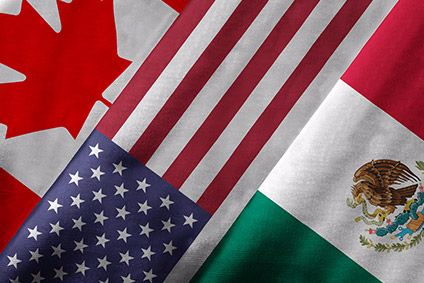
The US apparel and footwear industry is the latest to issue its support for, and welcome the implementation of the US-Mexico-Canada Agreement (USMCA), which comes into force today (1 July).
The USMCA makes a number of updates and modifications to the 25-year-old North American Free Trade Agreement (NAFTA) and will offer qualifying textiles and apparel, travel goods and footwear originating from the USMCA region duty-free access to the US and Canadian markets.
It also includes new provisions on textiles that incentivise greater North American production, strengthens customs enforcement, and facilitate broader consultation and cooperation among the three parties.
American Apparel & Footwear Association (AAFA) president and CEO, Steve Lamar, welcomed the implementation of the trade pact in a statement yesterday (30 June), describing it as a “win” for the industry as it provides businesses with “certainty to support supply chain operations that employ hundreds of thousands of Americans”.
“When negotiations began, AAFA asked for three things – that the new agreement remain trilateral, that it not harm the industry’s supply chains, and that it be seamlessly implemented. Thank you to the Administration and Congress for reflecting each of these requests in the final deal, for approving the agreement with a bipartisan majority, and for working around the clock to ensure tomorrow’s successful launch.
“With the USMCA entering into force, American businesses are excited to continue to work with supply chains in the North American region. Allowing the agreement to provide structure and avoiding the imposition of unnecessary trade barriers, such as punitive tariffs, will be essential for these American businesses and the American workforce to succeed and prosper under the agreement. Ensuring predictability and lowering trade barriers are always important, but even more so now, as we recover from and safely restart our economy in light of Covid-19.”

US Tariffs are shifting - will you react or anticipate?
Don’t let policy changes catch you off guard. Stay proactive with real-time data and expert analysis.
By GlobalDataEarlier this week, the US manufacturing industry voiced its support and commitment to engaging with the governments of the US, Mexico and Canada to ensure the pact is implemented in a way that will support the recovery and renewal of its economies.
In an updated statement today, Jay Timmons, the CEO of the National Association of Manufacturers (NAM), said: “This is a milestone day for manufacturers, years in the making. The landmark trade agreement we fought hard to secure now enters into force at a critical time. It will help restore certainty, ensure supply chain continuity and provide opportunities for economic growth—all of which will help our industry lead the nation’s recovery and renewal.
“The United States, Mexico and Canada must continue working together to ensure that the USMCA is implemented in a way that will bolster that recovery and renewal and maintain broad support for open, rules-based North American trade—this year, next year and well into the future. The stakes have never been higher.”
A statement released by the Office of the US Trade Representative (USTR) also welcomed the news noting: “USMCA enters into force today, replacing the job-killing NAFTA failure and fulfilling a core promise President Trump made to the American people.”
Ambassador Lighthizer adds: “The USMCA contains significant improvements and modernised approaches that will deliver more jobs, stronger worker protections, expanded market access, and greater opportunities to trade for companies large and small. We have worked closely with the governments of Mexico and Canada to ensure that the obligations and responsibilities of all three nations under the agreement have been met, and we will continue to do so to ensure the USMCA is enforced.
“The recovery from the Covid-19 pandemic demonstrates that now, more than ever, the United States must stop the outsourcing of jobs and increase our manufacturing capacity and investment here at home. With the USMCA’s entry into force, we take another giant step forward in reaching this goal and advancing President Trump’s vision for pro-worker trade policies.”



